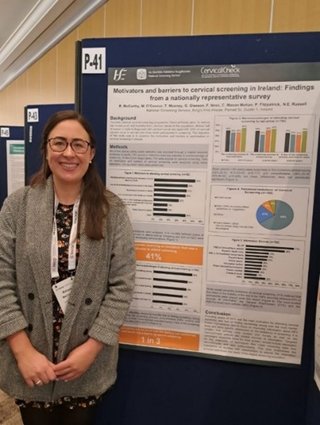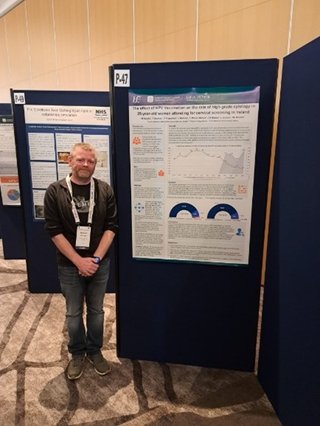It is a priority in our strategy to share our expertise and demonstrate our performance internationally. In April, we attended and presented a number of scientific posters at the British Society for Colposcopy and Cervical Pathology (BSCCP) annual scientific meeting in Birmingham.
Motivators and barriers to cervical screening in Ireland
Presented by our Research Officer, Dr Róisín McCarthy, this poster includes data from an online national survey carried out in 2021 examining the attitudes to cervical screening among adults aged 18+ years in Ireland. The results show that providing peace of mind was the main motivation for attending cervical screening and the fear of finding something wrong was the main barrier to attending. The data also indicated that future interventions should focus on improving information about HPV tests and providing more specific information on the limitations of screening. Findings from this study emphasised the importance of working with stakeholders to ensure information provided on cervical screening addresses the needs of the eligible screening population.
Knowledge of cervical screening and cervical cancer in Ireland
Dr McCarthy also presented a poster exploring the knowledge of cervical cancer and cervical screening from the same survey. Results from this study found that the majority of respondents felt they were not knowledgeable about cervical cancer. Many respondents were also not confident in their ability to recognise cervical cancer symptoms and many believed that cervical screening was a diagnostic tool. However, more than half of the respondents believed that cervical screening is the best way to reduce cancer risk and a significant proportion identified the HPV vaccination as another way to reduce risk. Nearly half of respondents aged <44 years believed that people aged 20-30 years were most at risk of developing cervical cancer. These results indicate that information resources should focus on clarifying these messages when informing the population about cervical screening and should highlight the measures that can be taken to reduce cervical cancer risk.
Potential impact of HPV vaccination on cervical disease in Ireland
Business Intelligence Analyst with the NSS, Michéal Rourke presented a poster on ‘The effect of HPV Vaccination on the rate of high-grade cytology in 25-year-old women attending for cervical screening in Ireland’. The aim of this study was to examine the changes in the presence of high-grade cytology outcomes in 25-year-olds screened from 2010 to 2022 and compared this to the population data on HPV vaccination. Data was obtained from cytology results from the CervicalCheck database (2010-2022) and from the National Immunisation Office on the rates of HPV vaccinations in school-going females from 2008 to 2022. Results from this study provided early evidence of the potential impact of HPV vaccination on cervical disease in Ireland. Despite lower vaccination uptake in the initial catch up group, there are early signs of the positive protective effect of vaccination in women on their first cervical screen. As the higher vaccination coverage cohort become eligible for screening, a greater impact on high-grade disease is expected.
HPV awareness and understanding in Ireland
This poster, presented by our Research Officer Dr Mairéad O’Connor, examined the understanding about HPV and HPV screening among Irish adults eligible for screening, 3 years after the introduction of primary HPV cervical screening in Ireland. Findings highlighted gaps in HPV understanding and were similar to findings of a 2010 survey, suggesting understanding has not improved over the last decade. Information campaigns to address these knowledge gaps are needed to minimise the potential for adverse psychological effects (e.g. stigma) among the screening eligible population. In addition, older women (>45 years), in particular, are less knowledgeable and may require targeted communication. Results from this study highlighted that work is needed to ensure those eligible for cervical screening are aware of HPV and its association with cervical cancer.
Clinical Director of our CervicalCheck programme, Professor Nóirín Russell, also gave a presentation at the conference on the Irish perspective of the ‘Effect of HPV vaccination and changes to cervical screening on colposcopy workload’.
The BSCCP represents a common forum for multidisciplinary teams in healthcare to discuss and debate all matters relevant to the prevention of cancer of the cervix. The BSCCP plays an important role in the training of colposcopists ensuring a continuum of high-quality trained individuals to support the delivery of an effective service. Attendees at the conference included colposcopists, general practitioners, obstetricians & gynaecologists, cervical screening programme managers and public health researchers.

